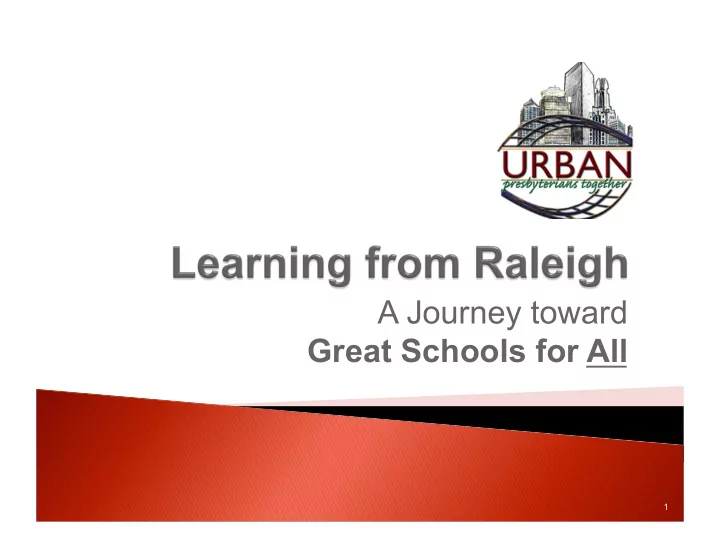

A Journey toward Great Schools for All 1
2
Theological grounding ◦ God’s sovereignty ◦ Christ transforming culture 3
PC(USA) Statements ◦ 1950 – Public school integral to American life ◦ 1961 – Public education and poverty ◦ 1972 – Statement on education ◦ 1987 – Call to Church Involvement in the Renewal of Public Education ◦ 2010 – “Loving Our Neighbors: Equity and Quality in Public Education” 4
46 % of children live in poverty 2 nd highest poverty rate in nation >80% RCSD students qualify for free or reduced price lunch Combined with 45% graduation rate in city (lower for minorities), unacceptable for community’s future 5
100% 90% 80% 70% 60% 50% 40% Poverty Grade 3 30% 20% 10% 0% 6
For optimal learning, school buildings should have no more than 40% FRPL students Once the number of FRPL students exceeds 53%, a school building begins to fail. FRPL = Free or Reduced-priced Lunch 7
Small group from UPT exploring problems with urban schools Read Gerald Grant book, Hope and Despair in the American City , and were motivated to act Asked what we could learn from Raleigh that might be applied in Rochester Further motivated by GradNation 8
Expanded our group beyond UPT ◦ Even beyond Presbyterians! Obtained funds from The Community Foundation for 2-way exchange with Raleigh 9
Beth Laidlaw Corni Labrum John Thomas Don Pryor Lynette Sparks Michael Ford Mark Hare Diane Larter Larry Marx Clay Osborne Dorelis Osborne 10
Parents whose children have graduated from or are still in suburban, urban and private schools Community members, tutors, and educators from the faith community Leaders from non-profit agencies Business Leaders Journalists 11
Representatives of elected officials School board members or administrators School district employees Advocates for a specific solution 12
Individual children can overcome the effects of poverty Individual schools can overcome the effects of poverty But what about school districts and systems and populations of children ?? 13
Going to a high-poverty school, or a highly segregated school, profoundly affects students’ achievement outcomes, above and beyond the effect of his or her individual poverty or minority status. Both the racial/ethnic and social class composition of a student’s school are approximately 150% more important than a student’s individual race/ethnicity or social class on educational outcomes. 14
Administrators (current and former) Board Members (current and former) Mayors (current and former) Teachers and Students in 3 Schools Parents Civil Rights Leaders Business Leaders Journalists Clergy Members 15
Socioeconomic balance/40% cap is key ◦ Raleigh did through 35 Magnet Schools and voluntary choice All students can learn; good public schools for all Disparities reduced without negative impacts on middle class ◦ Almost 70% Raleigh graduation rate for low-income and minority students Clear relationship between good public schools and economic development impact Focus on strong leaders and teachers in schools 16
Community Leaders Built Consensus around Great Schools Targeted Resources Economic Diversity Cap – 40% is key Magnetized Schools Year Round Option Set High Bar Focus on Professional Development 17
All kids can learn All students need access to good public schools, regardless of zip code Classroom diversity RCSD overall performance levels unacceptable if community is to survive and thrive; must have strong central core Solutions must involve entire community; city can’t solve by itself Create strong magnet schools of choice that attract students from city and suburbs; beyond ability of individual districts to provide alone 18
Academic Imperative: ◦ Excellent public education for all Economic Imperative ◦ Great schools attract economic development, revitalize neighborhoods, change demographic realities & workforce composition The Moral Imperative 19
Concerted, targeted effort to mobilize faith communities toward action Courageous conversations on race/equity and justice Interfaith effort had powerful effect in developing community groundswell for change Trained and developed mentors and tutors 20
Children are not “at risk,” they are “at promise” Jesus said, “just as you did it to one of the least of these …you did it to me.” Matt. 25:40 21
Home of… Susan B. Anthony Frederick Douglas Charles Finney Walter Rauschenbusch 22
Need broad community collaboration and strong leadership Need cooperation and policy changes at local and state levels ◦ Regional carve-out legislation Develop local pilots to help move toward achievement of key principles/goals Organization of faith community support will be key to build grass roots momentum 23
RCSD Supt. and Board Chair Monroe County School Boards Association Rochester Business Alliance and other business leaders Farash, ESL and RACF foundations Proponents of charter schools Regents Mayor Warren ROC the Future BOCES and School District Supts. Higher Education leaders Faith community leaders Union leaders Jim Lawrence/editorial board/Unite Rochester 24
How can we partner to unify the greater Rochester community? How can we guarantee great schools for all children? How can we choose on moral grounds to change the conversation and create equity in education? 25
November 10 summit for community leaders, with larger follow-on spring event planned ◦ Seeking grant funding Ongoing research on other communities’ efforts Continuing to tell our story ◦ Who can you help us reach to tell our story? 26
27
Lead a book study on Grant’s book Read summaries of the research ◦ (bibliography provided) Read RACF Poverty Report 28
Tutor Provide basic needs (gloves/hats/coloring books) Stock a clothing closet Provide weekend food distributions Provide fieldtrip scholarships ($300) RCSD Attendance Blitzes (9-11, Thur. Oct 23) 29
East: Brighton, Pittsford, Penfield, Fairport North: West Irondequoit West: Brockport and Wheatland-Chili One way to the suburbs; not two-way 30
Sign up to help us host key leader education symposium on November 10 Sign up to help us develop communication outlets Sign up to receive future updates Help us tell this story 31
32
33
34
Recommend
More recommend